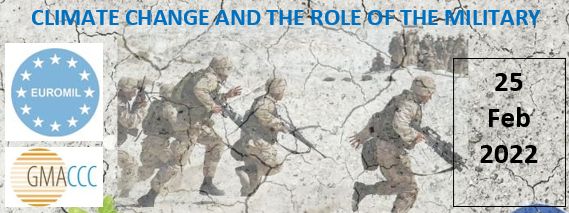Climate Change and the Role of the Military

Brussels, 25 February 2022
The EUROMIL panel discussion - organised in cooperation with GMACCC on 25 February 2022 - focused on the EU’s actions towards the ‘greening’ of the military and civil society’s point of view on what should be done next.
The president of EUROMIL, Mr Emmanuel Jacob, started the discussion by stating that EUROMIL has joined the European Climate Pact by making a pledge to contribute into brining the topic of climate change and defence into the policymakers’ agenda; by making changes into how the militaries are operating, their environmental footprint could be significantly reduced. Furthermore and according with EUROMIL’s internal survey on climate change, the majority (92%) of the participated members stated that they would like EUROMIL to become more engage into the climate change discussion.
The representative of the European Defence Agency (EDA), Dr Constantinos Hadjisavvas presented the agency’s ongoing work towards sustainability in the military, as the Energy Consultation Forum or the Circular Economy in Defence Forum. On another point, Ms Linsey Cottrell from the Conflict and Environment Observatory (CEOBS) highlighted that the current reporting of military emissions is poor and more transparency is needed in order for the militaries to reduce their environmental footprint and avoid the risk of green-washing.
The participants underlined that international organisations such as NATO and the EU are understanding the important connection between climate change and the military and hence the need to work towards the ‘greening’ of the sector. EU’s defence initiatives, as the Permanent Structured Cooperation (PESCO), the European Defence Fund (EDF) or programs as HORIZON Europe could significantly contribute into climate adaptation in the military. More cooperation with the civil society could also have a positive impact in this regard.
The President of EUROMIL also underscored that military personnel need to become more informed about climate change, as it has a direct impact on their missions; training officers and soldiers to better respond and adapt to climate change is becoming more and more essential.
The event was moderated by GMACCC Secretary General, Jamie Shea, who concluded that investments and modernization of capabilities is important and to the extent that it is possible the military should acquire ‘green equipment’ to adapt to the global threat of climate change.
Presentations:
EDA role in tackling energy and climate considerations
By Dr Constantinos Hadjisavvas, Project Officer Energy -CF SEDSS III Project Manager, European Defence Agency (EDA)
Climate Change and the Military
By Linsey Cottrell, Environmental Policy Officer, Conflict and Environment Observatory (CEOBS)
See also: CLIMATE CHANGE AND THE DEFENCE SECTOR SURVEY REPORT – 2022 which provides an overview of the actions that European governments are taking towards sustainability in the military.